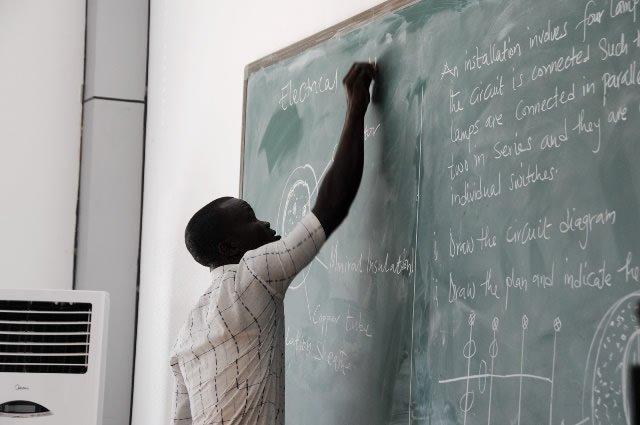The story of a female teacher who has spent 28 years of her life teaching but currently lives on loans moved listeners of Luv FM to raise money to offset her debts.
The female teacher, who called into the discussion on why teachers are leaving the profession, revealed that she has been teaching for 28 years and despite her current position as a headmistress, she earns less than GH₵50,000 a year.
She told host of the Luv In the Morning, David Akuetteh, she relies on loans to take care of her three children and survives on a monthly salary of GH₵950 after numerous deductions.
“Things are very difficult as I have to obtain loans to meet even basic needs,” she said.
“I have three children and only yesterday I contacted different colleagues to obtain a loan for my elder daughter’s upcoming university fees.”
She also revealed that after deductions her monthly GH₵2,000 salary as a headmistress is reduced to GH₵950 a month.
“It’s difficult because I haven’t been promoted since 2001,” she said. “Things are very difficult at school as I sometimes have to use my own salary to cover everyday school costs such as making photocopies.”
She confessed that she has stayed in Ghana her whole life for the love of teaching children but, presently, if she were given an opportunity to leave she would accept it willingly.
An appeal for support from host David Akuetteh yielded over GH₵1,000 while on air.
Many teachers identify with the plight of this teacher, as the living condition for many who have sacrificed their entire lives for the classroom job in the public sector even in the face of rising economic costs.
A June 2022 survey by GNAT revealed that roughly, 7,000 teachers are quitting their jobs annually.
The survey outlined that this problem is particularly prevalent in rural areas because there is a lack of accommodation for teachers along with neglect in the form of unfavorable government policies.
Ashanti Regional Chairman of the Ghana National Association of Teachers (GNAT) Prosper Tachie and the Ahafo Ano GNAT District Chairman, Elvis Prince Biney, on the show, identified poor working conditions, lack of income, and opportunities for growth as some factors causing teachers to leave Ghana.
GNAT Regional Chairman, Tachie Prosper, mentioned that teachers with 20 to 30 years history of teaching, like the headmistress who called into the show, made sacrifices to stay in Ghana despite being severely underpaid.
He said although teachers are earning more recently on paper, the purchasing power of their salary has severely diminished with time.
“In the ’90s and ’80s, teachers were earning around GH₵640 but now, they are earning around GH₵1,800,” Prosper said. “These figures are misleading due to the devaluation of the Ghanaian Cedi (GH₵).”
“The exchange rate in the ’90s was approximately GH₵2.3 to $1 whereas it but most recently valued at GH₵8.8 to $1.” He said.
Jojo, a rural-based junior high school teacher, and caller to the show revealed that another major problem facing teachers in rural areas is language barriers.
“Although we are meant to teach in English, many students in rural areas struggle with the language,” Jojo said. “Communicating apart from teaching is mostly done in the local language which is not understood or spoken by many teachers posted in their given regions.”
GNAT District Chairman Elvis Prince Biney explained that although teachers are given certain advantages such as responsibility and car maintenance allowance, payment is not guaranteed.
“What’s interesting is that when you get promoted, your responsibility allowance decreases whereas at the same time your responsibilities increase,” Binay said.
GNAT Regional Chairman, Tachie Prosper revealed he has not received his car maintenance allowance since 2019.
Elvis Prince Biney noted that the salary increase upon promotion is so low that it practically does not contribute any significant effect.
“For example, the salary increase from Senior Superintendent I to Principal Superintendent is only GH₵150.”
Despite the challenging life of teachers, there’s a public assumption that teachers do not make use of free time.
“One thing we must realize is that even when teachers are out of class they are busy grading assignments amongst other things,” Binay said. “Teachers even work when they are at home because they must make lesson plans and examinations/quizzes for future classes.”
Both Binay and Prosper agreed that teachers in Ghana are forced to work in dire conditions and are not given the respect that they deserve for the important work they do.
Tuomi, a passionate caller to the show and a local teacher, maintained that Ghana must apologize to teachers for the horrible way the country has treated them.
“Teachers are slaves to the Ghanaian community,” Tuomi said.
ALSO READ:

